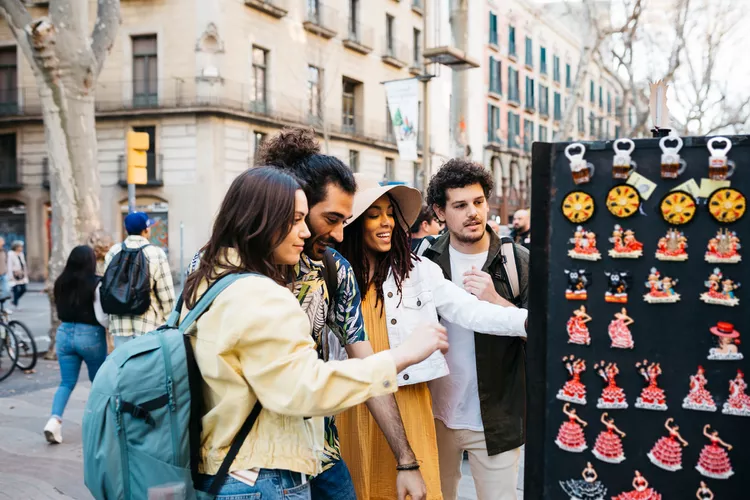1. Saving Money While Traveling
2. Tips on Purchasing Souvenirs
3. Smart Spending Strategies
We all enjoy feeling carefree when we’re traveling on vacation, but those lighthearted emotions can sometimes lead to unnecessary spending. I’m not suggesting that you pinch pennies or sacrifice enjoyable experiences, but expert advice can help you avoid wasting money or returning home with buyer’s remorse.
In an interview with GoTravelDaily, Kristen Gall, retail and shopping expert at Rakuten, the leading cash back shopping platform, states, “When it comes to traveling, it’s hard to resist buying items so you can have a piece of that memory at home. However, it’s essential to remember that you don’t need every souvenir that catches your eye.”

Gall adds, “When traveling abroad, I recommend purchasing only items that cannot be found back home, or that are small enough to not impact your luggage weight. If you’re set on bringing home a souvenir, save up for one special thing instead of wasting money on a bunch of trinkets you may not think twice about once you return home.”
If you’ve ever had to leave a purchase behind at security or customs, you will agree with Gall’s advice here. “It’s crucial to remember that you’re going to have to travel back with everything you purchased. Therefore, avoid buying fragile, bulky, and heavy items, as you will likely have to pay for oversized luggage fees once you get to the airport. Be cautious when buying food or wine, as it may not make it through customs. Foods like chocolate are typically fine, but items like meat and produce are likely prohibited to bring back into the country.”
California financial advisor Gerry Andrade, of Gerry Andrade & Associates, agrees with Gall’s insights. Being a frequent traveler with his family, Andrade recommends only buying items that are unique and easily transported. He recounts a story about a trip when his 10-year-old son fell in love with a painting in Rome’s Piazza Navona, and they bought it, ensuring it was safely placed in a tube for travel. Unfortunately, after visiting several destinations, they arrived home only to find the painting missing, illustrating how an important purchase can easily be lost while traveling.
Andrade also offers strategies to save and manage expenses while traveling, such as using a credit card with no foreign transaction fees. The card he utilizes also provides cash rebates for every purchase. “While traveling, we use this credit card exclusively to monitor any fraudulent charges, which is essential. More importantly, it alleviates the need to carry a lot of cash that can be easily lost or stolen.” Additionally, Andrade mentions using a separate debit card to access currency from ATMs if needed. Although there is a bank fee, for the convenience, it’s worth it. Moreover, ATMs often provide the best exchange rates.

Travelers looking to stretch their budget can save by planning, comparing, and researching hotels, restaurants, and tours. This is where travel advisors or agents can offer substantial help. According to JoAnn Caputo Tripi of Protravel International in Westbury, New York, travel advisors can often secure resort credits, bulk airfare rates, and room upgrades while providing local knowledge and experience.
Smart travelers also do their research before making decisions. Regarding hotels, Tripi suggests considering prepaid or advance purchase hotel rooms. While they offer discounts, these rooms are paid in full and are nonrefundable. The pandemic has highlighted the importance of flexibility, and the peace of mind that comes with the ability to cancel if necessary is worth a few extra dollars. Additionally, savvy travelers avoid the minibar in their rooms to prevent unnecessary expenses.
Dining at restaurants is another major expenditure while on the road. However, thrifty travelers look for local establishments instead of relying on hotel dining for every meal. They tend to avoid tourist-heavy spots and protect their vacation funds. Tripi recommends skipping the hotel breakfast unless it’s included in the room charge. Instead, opt for traditional local breakfasts, such as a cornetto in Italy, croissant in France, or pastel de nata in Portugal, paired with your morning coffee.

Renting a car can be necessary; however, travelers should compare the cost of alternatives like trains, public transportation, taxis, and car services before making a rental decision. Additionally, consider the cost of parking, which can often be quite high and poorly accessible in various countries. If renting a car turns out to be the best option, ensure you research whether you need extra insurance. Many credit cards and auto insurance policies provide coverage for rental cars, which can save you a significant amount.
Travelers who keep a close eye on their budget also avoid purchasing travel insurance without fully understanding it. They meticulously compare rates and details, ensuring they know which situations are covered. Before buying medical coverage, it’s advisable to consult your current policies to avoid duplicate insurance. When evaluating travel insurance that covers trip interruptions, cancellations, and changes, be sure to consider the various policies and rules which can differ by state.

Travel often involves plenty of walking. Even if you don’t participate in organized walking tours, simply navigating airports can have you on your feet for miles. Therefore, it’s essential to avoid purchasing cheap shoes that are uncomfortable or won’t withstand rain and cobblestone streets. This advice also applies to luggage; no one wants to wrestle with a broken suitcase wheel or have their belongings ruined by a leak.
If you adopt some of these practical strategies, you can travel confidently, knowing that you may have saved enough to begin planning your next adventure.





